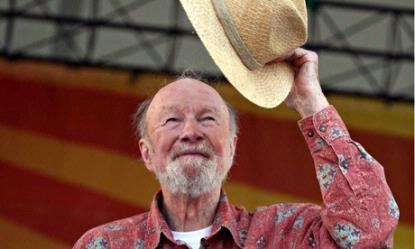I grew up in the theater. From the age of four I attended plays my father was in, and was trotting onstage myself soon afterward. I never wanted to be anything but an actor. Then, when I was 15, everything changed. I spent a summer at an arts camp in Vermont, where the focus was theater but the soundtrack was folk music.
Many of my fellow campers were left-wing New Yorkers, some of them the children of artists and activists blacklisted in the McCarthy era. They brought their guitars and record albums with them, and the voice on those vinyl discs that rang out most clearly and bravely to my eager Midwestern ears was Pete Seeger’s. His joyous tenor, driving banjo, unapologetic optimism, wholehearted commitment to ideas and causes, and above all, his songs of “love between my brothers and my sisters” amazed and excited me in ways only greasepaint and footlights had done before.
That summer, Pete Seeger literally changed my life.
I learned to play guitar, started writing songs, and soon spent more time in folk clubs and protest marches than I did in plays. Instead of a career in theater, I chose music. Even when those two loves intersected, in the years I was musical director of a social-activist theater in New York, it was Pete’s vision that inspired me.
I didn’t really know Pete Seeger, but I met him a few times—once as a teenager at the home of mutual friends, when I was literally speechless with awe; a couple of times in radio interviews, when he dutifully answered my questions but mostly wanted to talk about whatever topical issues were exercising him at the time; and once in a recording studio, sitting in the control room with Don McLean, two young singer-songwriters riding on Pete’s example, watching him flawlessly record an entire solo album in the time it took him to sing the songs.
When Pete died last month, I didn’t feel the shock of disbelief expressed by Rob Weir in his marvelous remembrance (“Pete Seeger can’t die. Pete, like your childhood home, was always supposed to be there. Forever.”—Valley Advocate, 2/6/14). For me, there was a sense of completion, a feeling of gratitude for a life lived so richly and generously.
Today, I’m once again primarily a theater person. But last weekend I joined several dozen other musicians in a Seeger tribute and celebration co-organized by Peter Blood and Annie Patterson, compilers of the indispensable singalong book Rise Up Singing. And in that reverberating church, as we all joined in on the songs Pete wrote and popularized—from “Old Devil Time” and “My Old Brown Earth” to “We Shall Overcome” and “This Land is Your Land”—I realized it wasn’t completion either.
Pete’s spirit was—is—so strong and lasting that every one of the hundreds of us who crowded the stage, jammed the pews and overflowed into the vestibule had stories like mine, of his inspiration and influence in our lives. By the end of the evening, from singing so long and loud and lovingly, my voice was ragged and sore—for the first time since the Seeger concerts I attended as an Pete-impassioned teenager. And I knew, as he always urged us, that we will all “carry it on.”

If you’d like to be notified of future posts, email StageStruck@crocker.com


